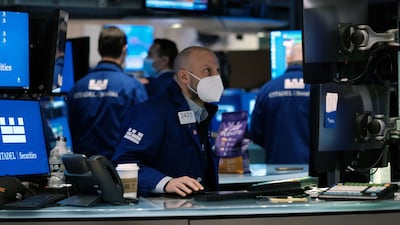The US Federal Reserve signalled on Wednesday that it plans to begin raising its benchmark interest rate as soon as March, a key step in reversing its pandemic-era low-rate policies that have fuelled hiring and growth but also escalated inflation.
With high inflation squeezing consumers and businesses, and unemployment falling steadily, the Fed also said it would phase out its monthly bond purchases, which aim to lower longer-term rates, in March.
The US central bank’s actions are sure to make a wide range of borrowing — from mortgages and credit cards to car loans and corporate credit — costlier over time.
Those higher borrowing costs, in turn, could slow consumer spending and hiring. The gravest risk is that the Fed’s abandonment of low rates could trigger another recession.
In a statement issued after its latest policy meeting, the Fed said it “expects it will soon be appropriate” to raise rates.
Though the statement did not specifically mention March, half the Fed's policymakers have expressed a willingness to raise rates by then, including some members who have long favoured low rates to support hiring.
By raising rates, the Fed will be betting that it can slow inflation without weakening the economy too much. Speaking at a news conference, Fed Chairman Jerome Powell expressed his view, as he has before, that controlling inflation is itself vital to a strong job market.
“The best thing we can do to support continued labour market gains,” Mr Powell said, “is to promote a long expansion, and that will require price stability.”
“I think there’s quite a bit of room,” he added, “to raise interest rates without threatening the labour market. This is by so many measures an historically tight labour market.”
The Fed on Wednesday also set out principles it will follow once it decides to reduce its nearly $9 trillion in bond holdings, a sum that has more than doubled since the pandemic struck two years ago. Some analysts expect the Fed to begin doing so as soon as July, a move that would contribute to tighter credit.
The central bank's latest policy statement follows dizzying gyrations in the stock market as investors have been gripped by fear and uncertainty over how fast and far the Fed will go to reverse its low-rate policies, which have nurtured the economy and the markets for years.
The broad S&P 500 index fell nearly 10 per cent this month before rebounding slightly on Wednesday.
Asked about the stock market's wild volatility, Mr Powell stressed that the Fed’s “ultimate focus” is on the “real economy".
But he added: “We feel like the communications we have with market participants and the general public are working. Monetary policy works significantly through expectations.”
High inflation has become a serious political threat to President Joe Biden and congressional Democrats, with Republicans pointing to rising prices as one of their principal lines of attack as they look towards the November midterm elections.

